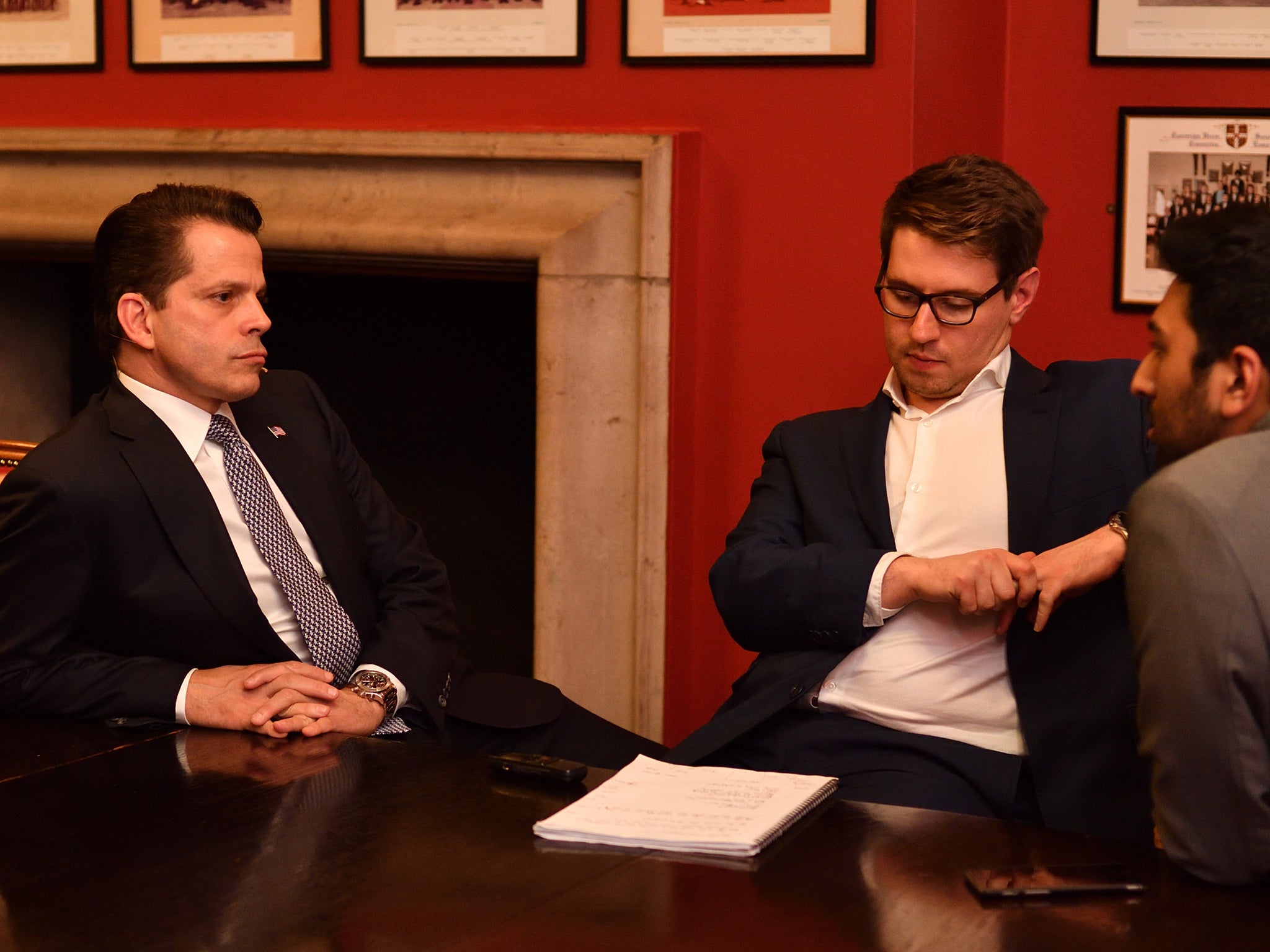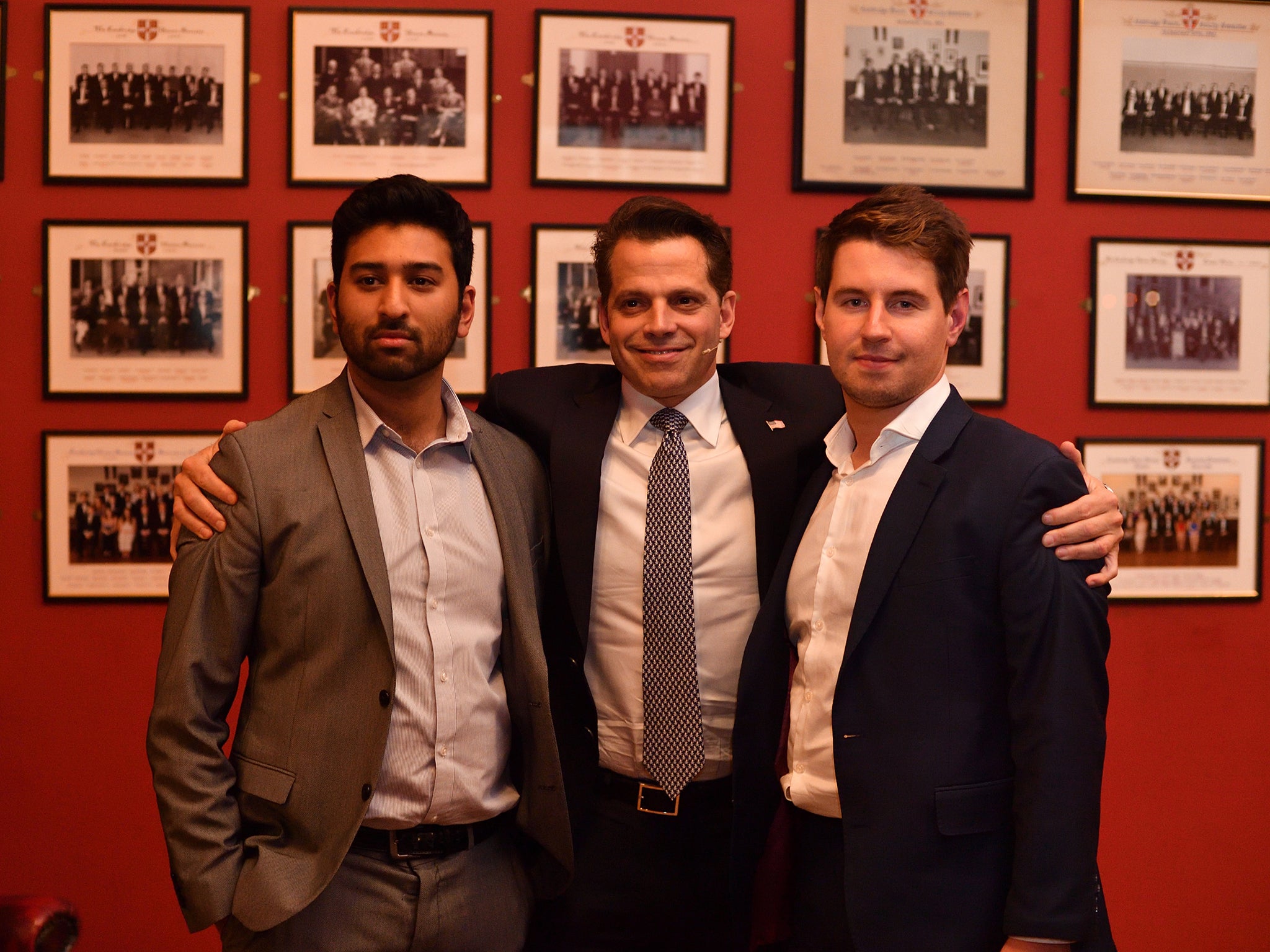Anthony Scaramucci on Trump, Bannon and his legacy: 'History will judge my 11 days as a success'
Exclusive: Infamous former White House communications director says he met his goals – despite his short tenure

Your support helps us to tell the story
From reproductive rights to climate change to Big Tech, The Independent is on the ground when the story is developing. Whether it's investigating the financials of Elon Musk's pro-Trump PAC or producing our latest documentary, 'The A Word', which shines a light on the American women fighting for reproductive rights, we know how important it is to parse out the facts from the messaging.
At such a critical moment in US history, we need reporters on the ground. Your donation allows us to keep sending journalists to speak to both sides of the story.
The Independent is trusted by Americans across the entire political spectrum. And unlike many other quality news outlets, we choose not to lock Americans out of our reporting and analysis with paywalls. We believe quality journalism should be available to everyone, paid for by those who can afford it.
Your support makes all the difference.Few things illustrate the turbulence of Donald Trump’s presidency – the controversies and the chaos, the rifts and the rivalries – as well as the saga of Anthony Scaramucci.
Appointed as the US President’s communications director in July to great fanfare, he swiftly oversaw the removal of several key West Wing staffers, before being unexpectedly and unceremoniously sacked himself after just 11 days in the role – a humiliation, he admits, that left him feeling “bummed out”.
Not that you’d know it from speaking to him. During an exclusive interview with The Independent, the 53-year-old is confident, bullish and relaxed. He says he has “no regrets” about his time in the White House, claiming his brief stint should be considered a success. He also does not rule out a return to working for Mr Trump.
He admits, however, that the President is a man who cannot easily be controlled by his advisers.
“I don’t think anybody controls the President,” he says. “I don’t think anybody made him President other than himself. Nobody controls him. In some ways that’s a good thing.”
The former Goldman Sachs banker was speaking during a visit to the UK, and had just addressed hundreds of students at the Cambridge Union.
He told students he believed he had suffered from racial profiling during his White House stint due to his Italian heritage, and talking openly about the difficulties of his high-profile dismissal.
There was no hint of bitterness – at least, not at those responsible for his firing. His anger was directed instead at the media, with virtually every answer including a reference to “you guys” in the press, or a fierce critique of how both he and Trump have been portrayed.
He believes criticism from the media has made Mr Trump a tougher character. “It’s literally like tempering steel,” he says. “It’s made him more resistant to the nonsense.”
Mr Scaramucci believes his 11 days as communications director will, in time, be seen as a triumph. He suggested he was brought in by Mr Trump to stem the flow of damaging leaks from inside the White House, and claimed he was successful in helping to “steady the ship”.
“There was a role that I was given, and in many ways I think history will reflect that I actually succeeded at that role – that I met a lot of the objectives of what the role was,” he says.
That is a reference to his part in forcing out Mr Trump’s then chief of staff, Reince Priebus, and his press secretary, Sean Spicer – both of whom departed within hours of Mr Scaramucci’s appointment. Steve Bannon, chief strategist, followed soon after. “The three or four people that departed the White House alongside me were gigantic leakers inside the White House,” he says.
He is particularly critical of Mr Bannon, claiming the former Breitbart News executive is “not a team player” and was overly focused “on his own brand and his own personal identity”.
The comments have mellowed slightly from those Mr Scaramucci made in an astonishing rant that paved the way for his sacking, during which – in a conversation that he thought was off the record – he told a New Yorker journalist that Mr Bannon was trying to “suck his own c**k” and called Mr Priebus a “f***ing paranoid schizophrenic; a paranoiac”.
Now, he says: “Actions speak louder than words. Immediately upon departure from the White House, Steve went against the President’s decision relating to the troop deployment in Afghanistan. That showed a lack of awareness of the global situation. Then he campaigned against the President’s choice for the Alabama senate race. Those are two major divergences from the President, and it shows a lack of team play.”
Mr Trump’s presidency has been defined in many ways by his Twitter activity: a series of stories – from claims he was wiretapped by Barack Obama, to a row about NFL players refusing to stand for the national anthem – have originated in 140 characters.
Speaking in London earlier in the week, Hillary Clinton had suggested this is a deliberate ploy designed to distract from what he is doing on policy matters, allowing himself to dominate the headlines while quietly rolling back a series of protections and regulations. It is a plan, Ms Clinton said, even if it seems impulsive.
Putting that claim to Mr Scaramucci does not go down well.
“Are we having an objective interview or a subjective one?” he barks. “Just be honest with me. Because you just called the guy impulsive.”
The question is, he suggests, a symptom of media bias. “Do you think he’s impulsive?” he demands to know. “Are you tipping your hand in terms of what you feel about him?”
Eventually he gives an answer – of sorts. “The President has done an unbelievable job of circumventing and sidestepping the nonsense that takes place in the media,” he says. “What you’re calling impulsive – because that’s your word – I’m calling strategic.”
He later says that Mr Trump uses his Twitter account as a “Molotov cocktail” in order to create the media narrative and “set journalists hair on fire”.
It is a theme he refers to time and again, accusing the media of trying to bring down Mr Trump and claiming he was “racially profiled” by journalists during his time in the White House.
Yet throughout our interview and his two hours speaking to students, he repeatedly refuses to criticise the men who sacked him: Mr Trump and his current chief of staff, General John Kelly.
And while he says consistently that he is happy to answer any question or discuss any topic, it is the questions about the US President’s difficulties that seem to jar with him most.

It is hard to tell whether this is purely a result of genuine loyalty to a man he calls a good friend, or whether it is a glimpse of a burning ambition to one day return to the White House and to refuse to do or say anything which could jeopardise that.
Having been given the briefest of spells in the heart of the West Wing, few would blame him for having one eye on a route back. And he is clearly aware of the transient nature of the President’s staff – the average tenure “is usually around 18 months,” he says, and therefore the vacancies – perhaps opportunities – that will no doubt arise in the coming months.
It is not surprising, then, when he refuses to rule out a return. Asked whether he hopes to work for Mr Trump again, he pauses – aware, perhaps, of the potential significance of his answer.
“I made great sacrifices to go in,” he begins. “If somebody asks me to go back I would certainly consider it. It would have to be for the right job and I’d have to be assured that I could have a little bit more runway, but I would never foreclose any options in my life.”
Only once does he come close to criticising Mr Trump, when asked about the President’s biggest weakness. Even then, he couches his language with the royal “we” and moves quickly away from anything that could constitute any sign of dissent.
Nonetheless, there remains the subtlest of suggestions that the President has been too stubborn, too unwilling to work with his opponents – until now, that is.
“Early on, we wanted to go for the whole enchilada,” he says. “We wanted [to get] 110 per cent of everything we wanted.”
Negative comment made, he switches back to talking about Mr Trump in the third person. “He’s making that adjustment now,” he says. “You saw him reach out to Congresswoman [Nancy] Pelosi and Senator Chuck Schumer twice. I think he’s making that adaptation now.”
So is he saying the President can be impatient? Sensing the conversation straying dangerously close to anything negative about Mr Trump, he hastily retreats.
“Not impatient.” There is a pause. “I think the outreach of the Democrats has been a favourable thing.”
Mr Scaramucci’s trip to the UK took place as Mr Trump came under attack on several fronts. He faced criticism over reportedly telling a grieving military widow that her late husband “knew what he was letting himself in for,” while reports also suggest he joked about Vice President Mike Pence wanting to “hang” gay people.
The billionaire businessman has frequently cut a forlorn and frustrated figure, turning to early-morning Twitter rants to express his ire. Is it fair to say Mr Trump is not enjoying life in the White House?
Apparently not. “I think all of that stuff is a bunch of BS,” Mr Scaramucci says. “There has to be aspects of the job that he doesn’t like… especially when you’re reading disfiguring things about you. I think he’s frustrated by some of the ways the media try to portray him, which is very different to how he actually is.
“But I think he does love being President, he loves the American people and he has a mission that he wants to execute, and I think he will achieve his goals.”
He is adamant that Mr Trump will seek, and win, a second term, saying sitting US Presidents are only voted out during times of economic crisis.
And he dismisses any suggestion that the US President could be impeached. So too the investigation in Mr Trump’s alleged links with Russia, which Mr Scaramucci describes as “a bunch of complete nonsense”.
The US President and his former communications director still speak. “If I call him, he will return my call, and he has reached out to me since I’ve left,” the latter reveals.
It is a sign of a relationship that has endured, and one the former staffer appears hell-bent on maintaining.
Given Mr Trump’s reported commitment to those who offer him total loyalty, it seems likely that the world has not seen the last of Mr Scaramucci – certainly not if he has anything to do with it.
Join our commenting forum
Join thought-provoking conversations, follow other Independent readers and see their replies
Comments